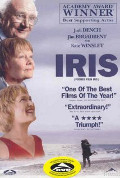
Directed by
Richard Eyre
Rated G
Reviewed by
Jim Thomson

Iris (2001)
Synopsis: A poignant love story, based on the memoirs of John Bayley, husband to the late Booker-prize winning author, Iris Murdoch, from the beginnings of her literary career to her decline into Alzheimer's disease decades later.Comparatively speaking, the life of Iris Murdoch was not a particularly tragic one. Born in Ireland, yet based in Oxford, she was a noted philosopher and the author of some 26 novels. It was in her 60's that she was diagnosed with Alzheimer's, a disease that effectively stole her true love from her. From the film's opening we are told just how much Iris relied on language, shown exactly what words meant to her. It is here that the tragedy lies, not in a life half lived, but in a life lived to it's fullest then cut dramatically short.
Both Murdoch and Bayley are portrayed by two sets of actors. Kate Winslet and Hugh Bonneville energetically portray the early days, while Judi Dench and Jim Broadbent bear the ramifications of fate's cruel twist. The two periods echo each other through the film, a moment in one reflecting forward or back to the other. While this gives the film a balanced feel, it simultaneously amplifies the difference between the two arcs. Winslett and Bonneville are excellent in their relatively trouble free roles, yet apart from painting a picture of Murdoch's unintentional (albeit constant) overshadowing of Bayley, they don't have much to do other than portray tentative lovers.
Broadbent and Dench on the other hand, have been given roles fit for true thespians and in no way do they shy away from the challenge this presents. Iris's gradual decline is as heartbreaking as it is beautifully portrayed by Dench while Broadbent's Bayley, following in the chronological footsteps laid down by Bonneville, struggles to keep up with his free-spirited wife. He remains ever mindful of her talents, yet slowly realises that this final flight is to somewhere he cannot follow. Honesty pervades the film, which obviously owes a great deal to Bayley's memoirs, "Elegy For Iris" and "Iris And Her Friends". With the "golden years" of their lives being noticeably omitted, one gets the feeling that all that matters is the couple's rise and fall. However, the four leads deliver more than enough passion to fill this narrative vacuum.
These days, it's a rare celluloid experience to have the tears of the audience drawn not from manipulation, but from superb acting and considered story telling. Iris effortlessly finds itself in this latter category. A beautiful film.

Want more about this film?


Want something different?




